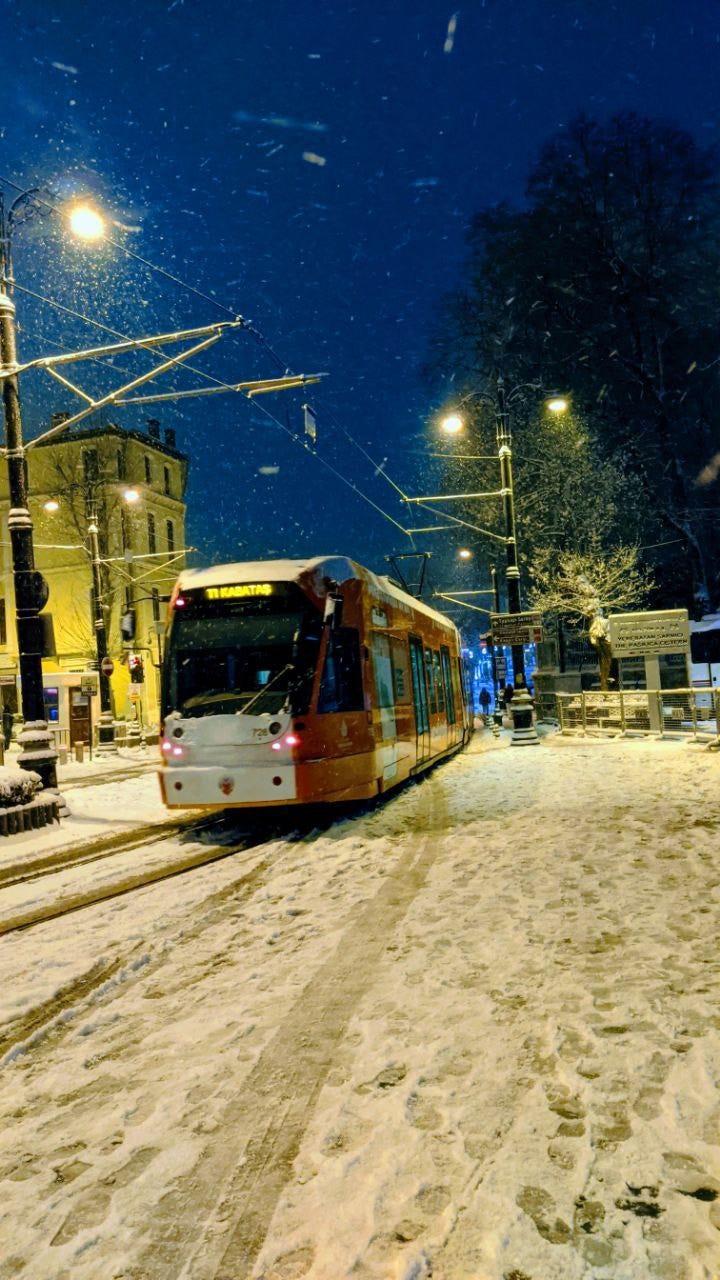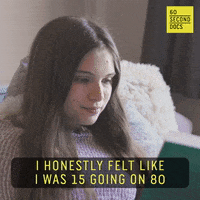My precious penguins,
Have you missed me? Since we last spoke (a month ago! the longest hiatus this newsletter has taken!) I’ve been around the world, sort of. We took a longish train trip from Berlin to Budapest and then flew to Istanbul for a few weeks. It was lovely, and freezing, snow in the streets, trams moving through white flurries, everything so still and white and cold. Now here I am back in Delhi, separated from my beloved, and the cold memories feel like a fever dream. My curtains are pulled against the sun, the fan is on on full blast, if I leave this room, the backs of my knees and the tip of my nose will be damp with sweat in no time at all.
Home in Delhi is my mother’s house. That’s a thing that has changed for me in the three months I was away this time. Moved from South Delhi to the East, where she’s been living all this while, as I made my jaunts across the city, across the country, across the world.
My mother lives in Patpargunj, one in a little set of grey flats, the outsides covered with gravel, the insides with two bedrooms, a living room, a kitchen, a balcony. Large for one person, perfect size for two, maybe a bit of a squeeze for three. Some people live here with their entire extended families: brothers and their wives and children in each bedroom, a grandparent in the living room sleeping on the day bed.
My mother loves living in Patpargunj, she likes the convenience of her “society,” where electricians and plumbers are just a call to the gate away. She likes the power back up (actually so do I), and the bustle of the market across the road with its warren-like streets, where humans and cars become a traffic jam together, dust flies up into our noses and you can get anything you’d humanly want. We went there yesterday looking for a tailor. I took out my phone to check Google maps, but it went into its own spiral, every time I looked for a turn to take a left or a right, it wasn’t there. In the end, Maps itself gave up long before my mother did, tiredly telling us that our destination was twelve minutes away on foot, no matter how much we walked.
My mother likes to ask for directions, I? I’d rather not speak to anyone unless absolutely necessary. At parties, I summon up my courage, at airports, I look for clearly marked signs, the longest I’ve been without talking to another human being while still being out in the world was several hours. I’d just rather not, I’d rather not. This is my number one instruction for people who come to visit me and then want to go exploring by themselves: don’t talk to anyone. I think the problem is I don’t know how to stop the conversation once I start, when can I stop being polite to the older gent next to me on the train and just look down at my book again? Do I have to keep up the conversation each time I get up or sit down? Do I have to answer questions when I don’t feel like it? How rude is too rude? So much easier to pull up my walls, pull down my curtains, offer a polite quirk of my mouth as a greeting and then disappear into music, books, looking out of the window, anything to preserve my sense of peace with the world. People are very bad for peace (and I keep choosing to live in cities and make friends over and over again.)
East Delhi, unlike South, is full of human interactions, even though I am in and out in an Uber, whizzing towards the Delhi I know as often as I can manage it. South Delhi is where I am a grown up, East Delhi is where I am a child. This flat was finished in the early 90s, we moved in briefly. I was eleven. We had cable television for the first time, and I watched kids shows in the morning as I got dressed. There was a group of children, all of us new to the area and to each other. We played together, but also kept an eye on one another warily. We were feral, a pack, leaderships coming and going. I didn’t care, I was never at the top: too odd, too bookish, too “English” even to ever win an election. I didn’t particularly like them, they didn’t particularly like me, but we didn’t need to like each other, we just needed to be collected, flat by flat, by two children, swelling into four, swelling into six, till we were enough to play a game. Ice-Spice, perhaps. (Which, for my non-Indian readers is what I Spy turned into after being rolled around in mouths, like sharp pebbles losing their edges.) Statue: where one child turned around and counted and you had to move and then stand still before the counter could catch you. We had little concerts: dance performances (I was the emcee for one of them), pot lucks (one girl brought jal jeera from her house, and I remember the spicy smell of it, how she kept drinking it herself), but they were not my Real Life, I always thought. My Real Life was still at school, Central Delhi at the time, my Real Friends were still my school friends, this was all just me marking time until I could return to it.
Have I told you this story before? How one summer I organised the other kids into a sort of Enid Blyton daydream of going house to house to ask for odd jobs to be done so we could buy ice cream? And no one let us in except for one house with two bachelors, who laughed and let us wash one cup and sweep the floors (badly) and gave us Rs 10, out of which we bought some orange lollies and had done with it? And then some of the mothers, up in arms and indignant at the caste lowering of their beloved children (“My child shall never sweep someone else’s floor! The horror!”) came to my mother, en masse, a gang of thugs in saris, and my mother said, coolly, “I’m actually kind of okay with my daughter doing other people’s dishes, it shows enterprise.” (Paraphrasing, but that was the message), and they had the wind taken out of their sails, and I was just told to not involve the other kids in my grand plans, thanks, but I’d realised it wasn’t an easy way to make money anyhow, so I was okay with this edict. A horrible little boy, one of those boys who probably threw stones at dogs when no one was watching, small eyes in a large pale face, who wasn’t part of our endeavour, who scorned it, was on the bus to my new school with me, and he said, “Jhadoo poncha waali” (lit: someone who sweeps and mops) each time I passed him and by his tone, I could tell it was something to be ashamed of, so I cringed, and he laughed, and this continued, until one day, I caught the eye of the boy next to him, and this Horrible Boy was saying, “Do you know, she does jhadoo poncha for other people?” and I just shook my head slightly, like ignore him, he’s crazy and the other boy laughed with relief, I wasn’t a tragic Other after all, I was just like him. And so ended my first brush with Delhi’s class and caste conciousness. Right here in Patpargunj, in an apartment complex inhabited by people who work in the media, so they should know better, but y’know, no one does.
The next time I lived in Patpargunj I was sixteen, and horrified at the idea of leaving my lovely Central Delhi life to return to it. The past five years, my father was posted in Delhi so we got a nice large house with a large garden, a little shabby and rundown, but it didn’t belong to us so we were okay with the shabbiness and also we lived in it so my school was walking distance away, Khan Market was our local market (oh it was not at all posh then, just one small cafe—Chona’s—and one bakery—Pat A Cake, and lots of small shops, and a video lending library. Archie’s Gallery at the back where we bought mix tapes and posters of rock stars.) My Real Life and After Hours life was practically the same: I had friends both in and out of school, and if I was unhappy, I took that as something lacking within me, not in the world itself. I went off to boarding school, and it was when I returned, sixteen, that my father was posted again to Bihar and it was back to Patpargunj with my mother and I. I cried. I wept. I threw huge fits. I began to wistfully look for nice small apartments in South Delhi where we could live but everyone concerned remained unconvinced. (I still look at real estate classifieds, still with the same wistful feeling, like an old ache in a limb broken a hundred years ago.)
Things had changed since the last time I was there. The apartments took on the sleek look of buildings inhabited. Now there was a car park, now there were fewer children than I remembered. I don’t know where they all went: the family of girls who lived in the next block had moved, and the eldest girl was our de facto leader, because she was so bossy. Did someone else’s mother die? I think it was the mother of the girl who I was convinced stole my little plastic and velvet figurine of a white seal, I called him Kotick after the Kipling story, one moment he was in my room, on my bookshelf, the next he wasn’t. He was such a perfect size to hold in the fist of your hand and slip into your pocket. I was in a new school by then, having returned from boarding school, it was all the way at the other end of the city, an hour by bus, and Delhi felt odd to me anyway. Like even though I’d spent my entire life there it didn’t belong to me.
As luck would have it, there were two other young women on my school bus who I became friends with. Two of us were even in the same section, and so the three of us became Patpargunj friends, drawn together by boredom, but growing, I think, a real and deep bond between each other. They were in and out of my house often, I think the freedom of my home suited them, and we walked on the roof, smoked a sneaky cigarette shared three ways, talked about how bored we were, how we wished we could be anywhere else but here. One of us liked Patpargunj, this was unreal to us two. “Really?” we’d say, “But why?” Unimaginable to think of liking this when all of South Delhi beckoned. I didn’t even say the words “Patpargunj” to people I liked, preferring the never used but more charming “IP Extension.” I only used it to get rid of boys who were coming on too strong, if they said, “Where do you live?” I’d say, “Patpargunj” baldly, and watch them scatter.
Without sixteen-year-olds, the world’s most conventional people, social order would just fall apart.
I started dating in high school and college. These fancy South Delhi boys with their fancy South Delhi cars would navigate the way across the old bridge—the zippy new one with five lanes and a way on to the Meerut Expressway wasn’t built till much later—and pick me up. My mother said I had to be home by eleven thirty, so at 10.45 I’d have to say bye and make whoever it was drop me home.
By then, I’d accepted it, it was part of who I was, my downmarket postcode. People formed opinions (and shared them easily, secure in their class status) about those with the wrong address. Your “East Delhi type” would have to be a certain way, and since I didn’t check off that box, the main reaction people had to me was surprise. Sometimes pity, poor old me, having to live so far from civilisation. I even had birthday parties in the apartment’s shared basement, and hosted house parties later, when my mum was out of town, all of us raucous and loud, someone broke a coffee table, someone traumatised my dog.
The thing is, you have to remember, we were all such awful snobs.
It’s an important part of Delhi’s history, you know, Patpargunj. It used to be where the grain warehouses were, a hub of commerce and large buildings, merchants back and forth across the Yamuna. There was a battle here on September 11, 1803, between the Marathas (led by the French) and the British army. (The Marathas lost.) The name literally means “land over the bridge.” Thanks to the Commonwealth games back in the mid noughties, there are swift flyovers between here and many parts of South Delhi, just what I dreamed of all those years ago.
There are advantages to living here, I concede, in my forties. Not just living in my mother’s house, which is a luxury, especially when you’re a grown up, and have your own house to run and don’t spend so much time with your parents as you used to. But also little things: all the taxi drivers have homes around here, so they never cancel when they ask me my destination, never take longer than three minutes to appear at the front gate. It’s secure, which is great for my anxiety, not an every-person-for-themselves place like my old colony, because we’re snug in an apartment among many apartments, everything is a collective, a community.
Maybe it’s what I need, as I wander across the world. A collective. A community.
Links which are kinda old because I’ve been sitting on them for a month but maybe you haven’t read them yet?
Freaky little interactive tool tells you your—well—place in the world’s population. Also how long on average you have left to live.
I loved this poem.
Ukrainian war diaries by ordinary citizens will make you sad but also think.
Related: Friend of the newsletter Ameya on India’s silence re: Ukraine which is a good read because of our collective Soviet pasts.
This on elephants (my favourite wild animals) is a long and beautiful read. (via Kat’s Kable, which is an excellent links newsletter you should subscribe to.)
That’s all I’ve got, friends! Write me back so I know what you’ve been up to. If you liked this newsletter or any of my others, consider buying me a coffee? Tips are nice and make me feel good.
xx
m
Who are you? Meenakshi Reddy Madhavan, writer of internet words (and other things) author of seven books (support me by buying a book!) and general city-potter-er.
Follow me on Twitter, Facebook and Instagram. (Plus my book recommendation Instagram!)
Got sent this newsletter? Sign up here to subscribe!
Forward to your friends if you liked this and to Past You sabotaging your own happiness if you didn’t.
Also, write back to me! I love to hear from you.






No comments:
Post a Comment
Thanks for your feedback! It'll be published once I approve it. Inflammatory/abusive comments will not be posted. Please play nice.